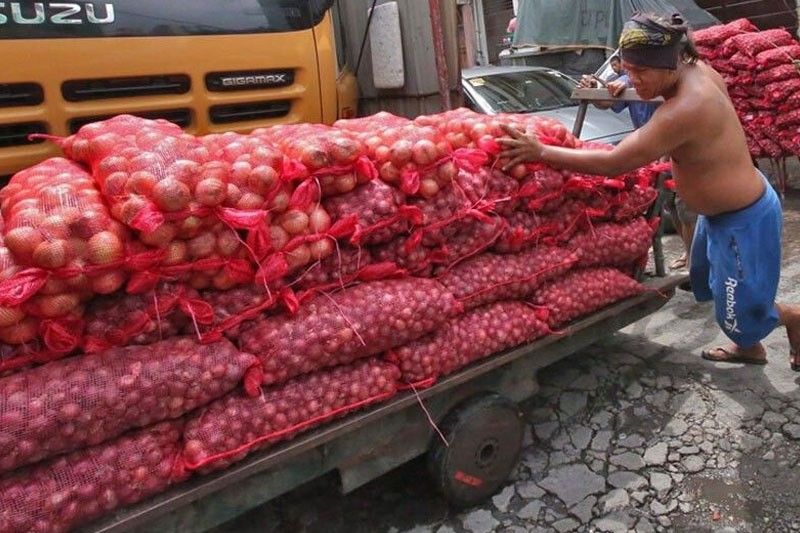Farmers’ group: P150/kilo SRP for onions not viable

MANILA, Philippines — A farmers’ group backed the decision of the Department of Agriculture to withhold the signing of a memorandum order on the implementation of P150 per kilo for red onions and P140 per kilo for white onions after another peasants’ organization criticized the DA’s “dilly-dallying.”
In an interview on Sunday with The STAR, Philippine Chamber of Agriculture and Food Inc. president Danilo Fausto said that the DA should ensure a win-win solution on the retail price for the bulbs, saying it should not only consider the welfare of consumers.
“It should be a win-win solution for all and not just one will be favored. It’s not only the consumer who should benefit as there are also producers to be considered,” Fausto said.
Agriculture Assistant Secretary and deputy spokesman Rex Estoperez has announced the decision of Agriculture Senior Undersecretary Domingo Panganiban not to sign the draft memorandum order on the SRP for onions, which was supposed to take effect on May 22, 2023.
Farmers’ group Samahang Industriya ng Agrikultura executive director Jayson Cainglet criticized the move, saying only the cartel and traders benefit from the delay in the implementation of the SRP.
Fausto maintained that the government should take into consideration the cost incurred from the farms until the onions reach the vendors in various markets.
“The farmgate prices reached between P60 and P80 per kilo. The cost to put it in cold storage is P7 per month for six months. It’s about P42 per kilo. This does not include the labor, spoilage, which will cost up to P50 to P60 (per kilo) so from the cold storage the cost is already P140, if you will impose P150 SRP, how can traders and retailers earn?” he noted.
Fausto said that traders who were able to buy onions at farmgate price P55 to P60 per kilo will be able to earn from the proposed P150 per kilo SRP.
“If traders will be given profit of P30 to P50 per kilo, the wholesale price of onions at the cold storage is already at P180 per kilo, and if you give P20 margin to the vendors in the markets, that’s P200 per kilo so the P180 to P200 (per kilo of onions) is still reasonable but not P150 (per kilo),” he added.
According to Fausto, the DA should instead make sure that the retail price of the bulbs will not exceed P200 per kilo. “It should not increase beyond P200 per kilo and it has to be supported by imports,” he said.
Fausto said that based on data from the Philippine Statistics Authority, the 10-year average of local onion production from 2011 to 2020 was at 179,000 metric tons.
“Our consumption per capita is 2.34 kilos. Multiply it to 112 million total population, that’s 262,000 metric tons. Our total local production in 2020 was at 229,000 metric tons, in 2021at 2018,000 metric tons and 2022 at 220,000 metric tons. If you need 262,000 metric tons and include at least 10 percent possible spoilage, that’s about 292,000 metric tons, so you still need additional importation of 70,000 metric tons,” Fausto explained.
Fausto said the imported onions should start to arrive in October and November in preparation for the increase in the demand for the holiday season.
“The stocks in cold storage will be depleted towards September, October. The imported onions should arrive in October, November, in preparation for Christmas and the white onions should arrive ahead,” noted.
He said that the government should increase the number of hectares planted to onions if it wants to achieve self-sufficiency in onion supply.
“We have high yields and we are at par with other countries. We produced 14,000 metric tons per hectare compared to Vietnam of six to seven tons only. We just need to increase the number of hectares for us to become sufficient,” he said.
Fausto added that the availability of cold storage facilities should also be addressed as he cited the case of Occidental Mindoro where traders are forced to store the bulbs in other provinces due to the problem in electricity supply.
Aside from Nueva Ecija and Pangasinan, Occidental Mindoro is also among the top producing onions in the country.
Based on monitoring of the DA in Metro Manila markets on Friday, the retail price of onions ranged between P140 and P190 per kilo. It went down from P200 per kilo after the announcement on the implementation of P150 SRP.
- Latest
- Trending






























